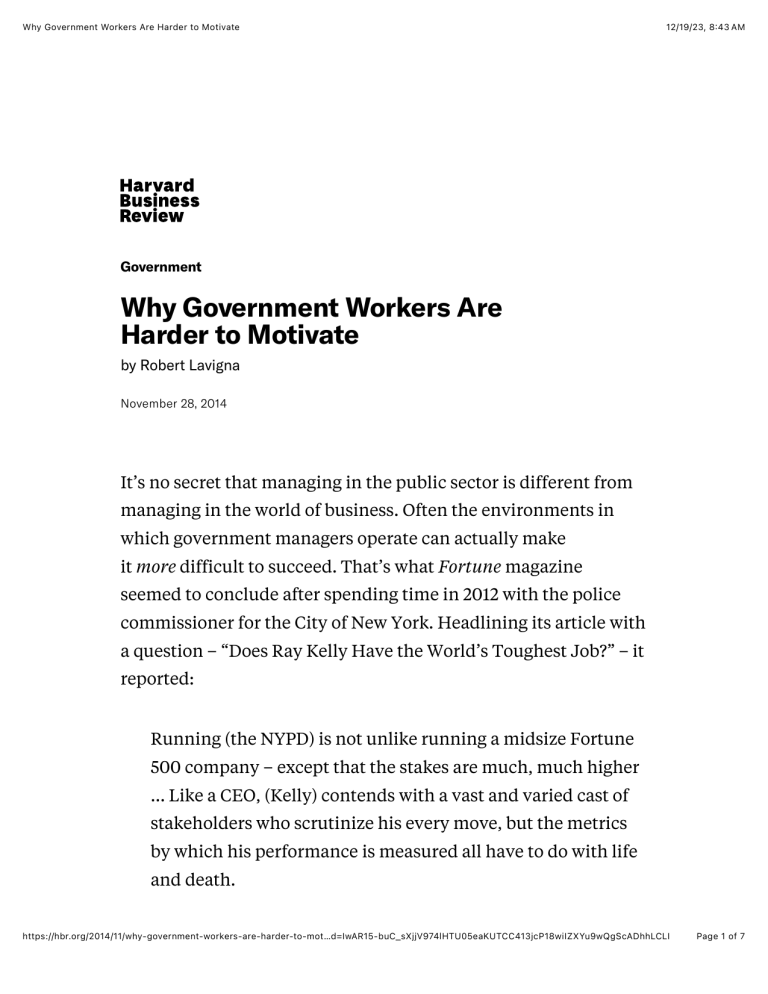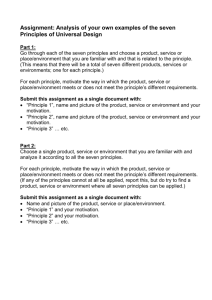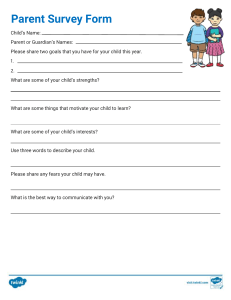Motivating Government Workers: Challenges & Strategies
advertisement

Why Government Workers Are Harder to Motivate 12/19/23, 8:43 AM Government Why Government Workers Are Harder to Motivate by Robert Lavigna November 28, 2014 It’s no secret that managing in the public sector is different from managing in the world of business. Often the environments in which government managers operate can actually make it more difficult to succeed. That’s what Fortune magazine seemed to conclude after spending time in 2012 with the police commissioner for the City of New York. Headlining its article with a question – “Does Ray Kelly Have the World’s Toughest Job?” – it reported: Running (the NYPD) is not unlike running a midsize Fortune 500 company – except that the stakes are much, much higher … Like a CEO, (Kelly) contends with a vast and varied cast of stakeholders who scrutinize his every move, but the metrics by which his performance is measured all have to do with life and death. https://hbr.org/2014/11/why-government-workers-are-harder-to-mot…d=IwAR15-buC_sXjjV974lHTU05eaKUTCC413jcP18wiIZXYu9wQgScADhhLCLI Page 1 of 7 Why Government Workers Are Harder to Motivate 12/19/23, 8:43 AM In these highly-visible environments, managers need government workforces to be highly engaged if they are to succeed. This requires that public sector leaders understand and address the factors that make increasing engagement in the public sector a special challenge. Here are seven factors that make motivating government employees difficult, plus one factor that is an advantage – and how managers can address them. Prevailing negative attitudes about government and government employees. Critics of government, including politicians and some media, portray public sector employees (i.e., “nameless and faceless bureaucrats”) as overpaid and underworked. Understandably, these images hurt employee morale and engagement. One approach to mitigating this situation is to show public employees that their agencies are working to educate the public about what they do and how it affects the public’s wellbeing. This can be done through press releases, public forums, websites, social media, and even outreach to schools. Managers can make employees aware, too, of how much power they have to shift public opinion. Research conducted by Gallup and the nonprofit Partnership for Public Service revealed that when citizens report having positive interactions with public servants, they are three times more likely to hold positive opinions of government in general. Engaged public servants can move the needle of public opinion about government, one interaction at a time. YOU AND YOUR TEAM Engaging Employees Frequent and abrupt changes in leadership. CEO turnover might be more common than it https://hbr.org/2014/11/why-government-workers-are-harder-to-mot…d=IwAR15-buC_sXjjV974lHTU05eaKUTCC413jcP18wiIZXYu9wQgScADhhLCLI Page 2 of 7 Why Government Workers Are Harder to Motivate Best practices for keeping your team focused and motivated. 12/19/23, 8:43 AM used to be, but the private sector still has nothing on the public sector in this regard. Many government jurisdictions and agencies are led by elected or politically-appointed leaders (including legislators) with brief tenures, specific policy agendas, and short-term perspectives. As the president of a large state university system recently put it, “legislators live in a two-year world.” Political turnover (without any real succession planning) makes it difficult to sustain engagement. To compensate, career managers must provide strong and stable leadership – and they need to manage not just down but also up, by onboarding new political leaders so they understand the agency’s values, mission, and goals, and especially how career employees are critical to achieving policy goals. Hard-to-measure achievement. Few things are more engaging than making important progress toward goals, but the goals of public-sector organizations are often hard to translate into objectively measurable units. Government managers must therefore clearly articulate long-term missions, values, goals, and impacts – and help employees see how their work connects. As one local government public servant put it: “When I found myself getting down, I would head to the front lines. Being among the citizens we served reminded me why I was there and why it was important to keep fighting.” An older workforce. The government workforce is more educated and more white-collar than the private-sector workforce. It is also older. Consider that, in 2013, 56.7% of federal https://hbr.org/2014/11/why-government-workers-are-harder-to-mot…d=IwAR15-buC_sXjjV974lHTU05eaKUTCC413jcP18wiIZXYu9wQgScADhhLCLI Page 3 of 7 Why Government Workers Are Harder to Motivate 12/19/23, 8:43 AM workers were between the ages of 45 and 64, compared to 42.4% of full-time private sector workers. Government managers can leverage the upside and minimize the downside of these demographics by emphasizing the kind of engagement that comes with applying long experience to solving critical problems. Managers can also maintain vitality in their groups by openly discussing retirement and helping older employees ease gracefully into the next phase of their lives. At the other end of the employee life cycle, it is crucial to recruit highly motivated new people to replace the departing baby boomers. Strong civil-service rules and employee protections. Engagement suffers terribly when some employees are seen as getting away with not pulling their weight. The fact that public employees have stronger job protections, even in nonunion organizations, than their private-sector colleagues, makes it more difficult to deal with poor performers. Managers must therefore clearly define employee expectations, provide frequent feedback, and take action to deal with substandard performance. They must also use the new-hire probationary period to weed out bad fits. All this applies to private sector managers, too, but the steps are even more important in government agencies, which are typically not at-will employers. Constraints on the use of financial incentives. Government agencies usually can’t provide performance incentives like large pay raises and bonuses; or perks like stock options, fitness center club memberships, and car services. Faced with limited ways to reward and recognize performance, government managers need to focus on agency mission and impact, and also provide https://hbr.org/2014/11/why-government-workers-are-harder-to-mo…d=IwAR15-buC_sXjjV974lHTU05eaKUTCC413jcP18wiIZXYu9wQgScADhhLCLI Page 4 of 7 Why Government Workers Are Harder to Motivate 12/19/23, 8:43 AM nonfinancial recognition. This includes adopting workplace flexibility practices, and providing non-financial recognition that sometimes means simply saying “thank you” and praising good performance. The University of Wisconsin Hospital and Clinics developed a “Thanks for Caring Recognition Tool Kit” to help managers and supervisors provide recognition. It lists rewards that managers can purchase but also includes ways to thank employees “without spending a dime.” Strong union influence. Unlike in the private sector, where union membership has declined to an all-time low (less than 7%), union membership in the public sector remains stable (more than 35%). Managers must therefore form alliances with labor. The city of Minneapolis has 23 separate collective-bargaining agreements and a workforce that is more than 90% unionized. Before conducting its first employee engagement survey, HR staff met with union representatives to discuss survey strategy and ask for support to generate a high response rate. HR staff also met with union reps to review survey results, including areas of strength and opportunities for improvement. Public visibility of government. The work of government is uniquely visible, due to open meetings/records laws that require agencies to meet in public and also provide, on request, meetings minutes, memos, decision documents, emails, and even text messages. This transparency means that public-sector managers committed to improving engagement need to help employees feel safe and secure, allowing them to feel comfortable voicing opinions, taking risks, and innovating. https://hbr.org/2014/11/why-government-workers-are-harder-to-mot…d=IwAR15-buC_sXjjV974lHTU05eaKUTCC413jcP18wiIZXYu9wQgScADhhLCLI Page 5 of 7 Why Government Workers Are Harder to Motivate 12/19/23, 8:43 AM Different employee motivations. Research has shown that public servants find meaning in their work by making a positive difference in the lives of the citizens they serve. This is an advantage in building engagement. Many employees enter public service because they are already committed to the mission of government. Agencies need to find, aggressively recruit, and then hire job candidates who are motivated by public service. Managers must then leverage public-service motivation by involving employees in decisions and helping them see and appreciate their individual contributions. As managers increasingly focus on engagement, a cottage industry has grown that promises any number of one-size-fits-all solutions and “secrets” to improve engagement. In truth, there are no secrets to maximizing employee engagement. Great management always begins with understanding the unique characteristics of the workforce, figuring out what makes employees tick, and creating the environment in which they can and want to do their best work. RL Robert Lavigna is Assistant Vice Chancellor and Director of HR at the University of Wisconsin and author of Engaging Government Employees: Motivate and Inspire Your People to Achieve Superior Performance. Recommended For You https://hbr.org/2014/11/why-government-workers-are-harder-to-mot…d=IwAR15-buC_sXjjV974lHTU05eaKUTCC413jcP18wiIZXYu9wQgScADhhLCLI Page 6 of 7 Why Government Workers Are Harder to Motivate 12/19/23, 8:43 AM Make the Most of Your Relocation When Business as Usual Isn't Working, Look to Nonprofits for Inspiration Why You Shouldn't Label People "Low Performers" PODCAST You Need a Generative AI Strategy https://hbr.org/2014/11/why-government-workers-are-harder-to-mot…d=IwAR15-buC_sXjjV974lHTU05eaKUTCC413jcP18wiIZXYu9wQgScADhhLCLI Page 7 of 7




